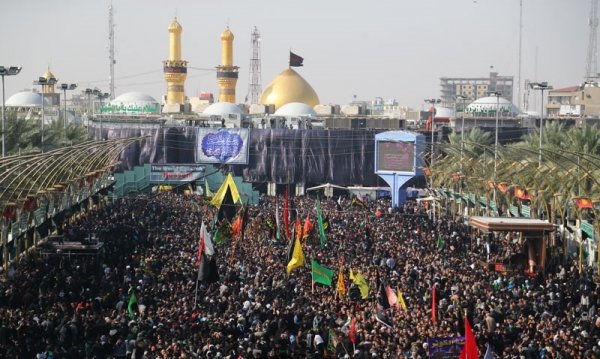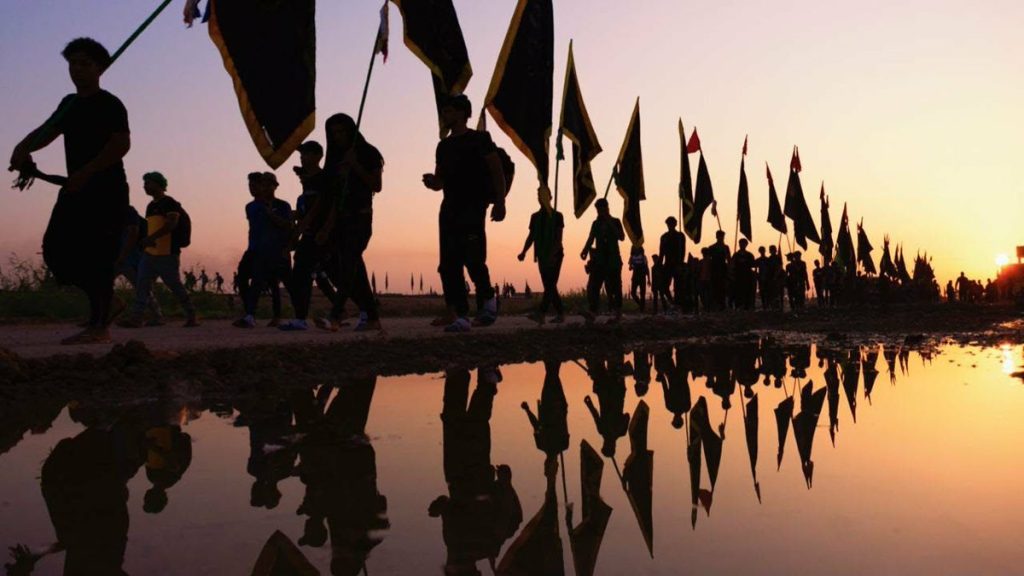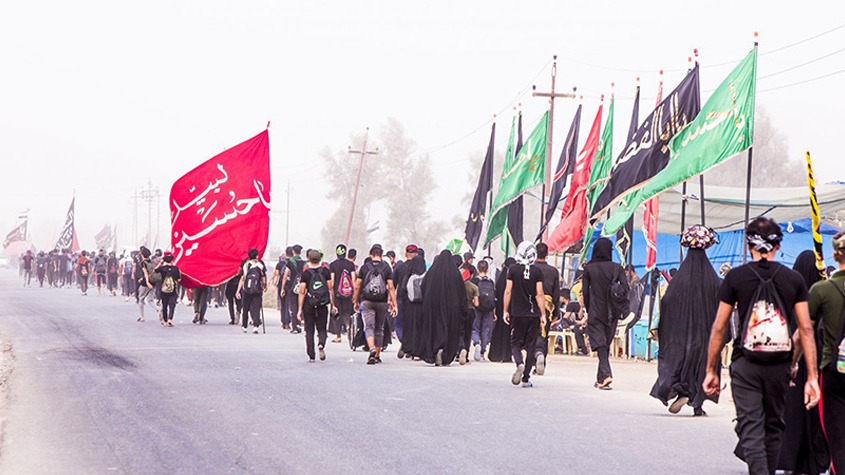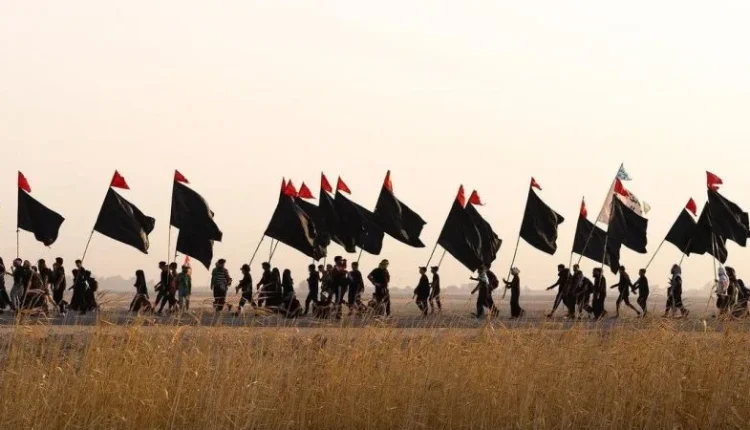Effects of Visiting Imam Al-Hussein, peace be upon him – Part One
Contents
Those who delve into the narratives about the infallible Imams, peace be upon them, which encourage believers to visit Imam Hussein, peace be upon him, will find them abundant. In fact, one might not even find as many regarding the visitation of the Noble Prophet, may God bless him and his family, even though he is undoubtedly superior to his grandson Hussein, peace be upon him. This is solely because of the distinctions and honors that God, the Exalted, has bestowed upon Hussein and his visitors. The Imams intended to spotlight the systemic oppression experienced by the Ahl al-Bayt (the Household of the Prophet). The tragic event of Hussein serves as an emblematic representation and symbol of the overall oppression faced by them. Furthermore, Imam Hussein, peace be upon him, played a pivotal role in reviving this Ummah (community) with a spirit of freedom, honor, and dignity. An Ummah that genuinely and closely connects with Imam Hussein is indeed alive, for Hussein was martyred, and the Holy Qur’an tells us: ‘And do not think of those who are killed in the way of Allah as dead. Rather, they are alive with their Lord, receiving provision, rejoicing in what Allah has bestowed upon them…’ [1](3:169-170). The Sha’baniyah visitation for the master of the martyrs also reaffirms this, stating: ‘I bear witness that you were killed, but you did not die. Rather, by the grace of your life, the hearts of your Shia were enlivened’.[2]
The Blessings of Visitation of Imam Hussain
There are numerous blessings associated with the visitation of the Master of the Martyrs, Imam Hussein, peace be upon him:
- Increased Provision: It is narrated by Imam Abu Ja’far, peace be upon him, who said, “Urge our Shia to visit Hussein, peace be upon him, for visiting him increases one’s provision.”
- Extension of Life: He also stated, “Urge our Shia to visit Hussein, peace be upon him, for his visitation not only increases provision but also extends one’s life.”
- Protection from Harm: Imam Abu Ja’far mentioned, “Encourage our Shia to visit Hussein, peace be upon him, for such a visit increases one’s sustenance, extends life, and wards off harmful afflictions.”
- Protection from Calamities: Imam Abu Ja’far Al-Baqir, peace be upon him, said, “Encourage our Shia to visit Hussein, peace be upon him, for his visitation wards off destruction, drowning, burning, and predatory animals.”
- Multiplication of Charitable Deeds: Imam Al-Sadiq, peace be upon him, remarked to Al-Halabi, “For every dirham spent by a visitor to Hussein, peace be upon him, it will be multiplied to ten thousand dirhams and that will be saved for him.”
- Fulfillment of Needs: Imam Al-Sadiq narrated, “Allah attends to his needs and takes care of his worldly concerns.”
- Safety on the Day of Great Terror: Zarara said to Imam Abu Ja’far, “What about those who visit your father, Hussein, in fear?” He replied, “God will grant them safety on the Day of Great Terror, and angels will greet them with good tidings, telling them to neither fear nor grieve, for it is their victorious day.”
- Forgiveness of Sins: Imam Al-Sadiq mentioned, “If a visitor knew the merit of his act, he would not be negligent or lazy.” Sulaiman ibn Khaled asked, “What merit does it hold?” The Imam replied, “Numerous benefits. Firstly, his past sins are forgiven, and he’s told to start afresh.”
- Achieving Divine Gaze Ensuring Paradise: Imam Al-Sadiq narrated, “Personally visiting Hussein, peace be upon him, carries the highest reward. His Lord sees him vigilant at night, weary from the day’s journey. God bestows upon him a gaze that ensures the highest paradise with Muhammad and his household. So strive for that honor and be among its recipients.”
- The reward of a Thousand Pilgrimages and Umrahs: Al-Qaddah said to Imam Abu Abdullah, “What about someone who visits Hussein bin Ali with full recognition of his right, devoid of arrogance or pride?” He responded, “He is credited with the reward of a thousand accepted Hajj pilgrimages and a thousand accepted Umrahs. Even if he was destined to be unfortunate, he will be recorded as fortunate, continually enveloped in God’s mercy.”
- The Eleventh: Intercession – Abdullah bin al-Fadl narrated, saying: “I was with Abu Abdullah Al-Hussein (peace be upon him) when he said to Al-Tusi, ‘O Tusi, whoever visits the tomb of Abu Abdullah Al-Hussein (peace be upon him) knowing that he is an Imam whom obedience is obligatory upon all, Allah will forgive his past and future sins and will accept his intercession for seventy sinners. And, he wouldn’t ask Allah the Almighty near his grave for a need, except that He fulfills it for him.”
- The Prayers of the Imams for him alongside Al-Zahraa and the Prophet (peace be upon him and his family): Imam Al-Sadiq (peace be upon him) was reported to have said to Muawiya bin Wahb: “O Muawiya, do not abandon the visitation to the grave of Al-Hussein (peace be upon him) due to fear. For whoever abandons it will face such regret that he would wish his grave was beside it. Wouldn’t you like Allah to see your figure and complexion among those whom the Prophet (peace be upon him and his family), Ali, Fatimah, and the Imams (peace be upon them) pray for?”

Similarly, Dawood bin Katheer narrated from Abu Abdullah (peace be upon him) who said: “Fatimah, the daughter of Muhammad (peace be upon him and his family), attends the visitors of her son Hussein’s grave (peace be upon him) and seeks forgiveness for them.” This is further supported by a narration from Imam Al-Sadiq regarding Muawiya bin Wahb, of which we cited a portion earlier in this gathering. Muawiya bin Wahb said: “I sought permission to see Abu Abdullah (peace be upon him), and it was granted. I entered and found him in his prayer area at his home. I waited until he finished his prayer and I heard him supplicating to his Lord, saying, ‘O Allah, You who have honored us with dignity, promised us intercession, chose us for the succession, granted us knowledge of the past and what’s to come, and directed people’s hearts towards us, forgive me and the brothers who visit my father Hussein’s grave. They have spent their wealth and exerted their bodies, hoping for our reward and what You have in store for our connection, seeking to please Your Prophet, responding to our call, and upsetting our enemies. They seek Your pleasure. Reward them on our behalf with Your contentment. Protect them day and night, bless their families and children they left behind, accompany and guard them against every arrogant oppressor and against every weak one you overpower…’ to the point he said, ‘O Allah, our enemies mocked them for their visits, yet they never ceased coming to us, opposing those who oppose us. Have mercy on the faces that the sun has altered, and those that rest over the grave of Abu Abdullah. Have mercy on the eyes that shed tears for our sake, the hearts that felt anguish for us, and the screams that were for us. O Allah, I entrust to You these souls and bodies until they meet You on the day of thirst by the pond.’ He continued to pray in this manner while prostrating. When he finished, I felt as if fire wouldn’t touch any of them ever. I wished I had visited the grave and not performed Hajj. The Imam (peace be upon him) said to me, ‘How close you are to him! What prevents you from visiting him?’ I replied, ‘I did not believe the matter was of such magnitude.’ He said, ‘O Muawiya, those who pray for the visitors in the heavens are more than those who pray for them on earth.’[3]
Warning Against Neglecting Imam Hussain’s Visitation
In contrast to these texts and narrations that are attributed to the visitation of Al-Hussein (peace be upon him), there are narrations that warn us against neglecting or abandoning his visitation. Some of these narrations even consider such neglect or abandonment as being undutiful to the Prophet (peace and blessings be upon him).
Al-Halabi narrated from Abi Abdillah (peace be upon him), where Al-Halabi said: ‘I asked him, ‘My master, what do you say about someone who neglects to visit Al-Hussein (peace be upon him) even though he is capable of doing so?’ The Imam replied: ‘Such a person has surely been undutiful to the Messenger of Allah (peace and blessings be upon him), undutiful to us, and has taken lightly a matter that is significant to him.’ Similarly, it is also indicative of what was narrated from Al-Baqir (peace be upon him): ‘If one of you performed Hajj all his life but did not visit Al-Hussein (peace be upon him), then he has certainly abandoned a right from the rights of the Messenger of Allah (peace and blessings be upon him).’
From this, we note that the Shia, throughout various eras and circumstances they went through, never abandoned visiting Imam Al-Hussein (peace be upon him). Even under the oppressive regimes of some of the Abbasid caliphs, such as Al-Mutawakkil Al-Abbasi (may God curse him), who assumed the caliphate position in the year 232 AH. During his reign, he began to increasingly oppress the Shia. Ibn Al-Athir described him by saying: ‘He had an intense hatred for Ali bin Abi Talib (peace be upon him) and his household. He would target anyone reported to be a follower of Ali and his family, seizing their wealth and even their lives.'[4]

Destruction of Al-Hussein’s Tomb and Persecution of Visitors
Similarly, Abu Al-Faraj Al-Isfahani described him saying: ‘Al-Mutawakkil was very oppressive towards the family of Abi Talib, harsh towards their followers, heavily interfering in their affairs, with intense animosity, suspicion, and accusations against them. His oppression reached a level that none of the previous Abbasid caliphs had reached. Part of that was the destruction of Al-Hussein’s tomb (peace be upon him), erasing its traces and placing ambushes on all the paths of the visitors. They did not spare anyone who visited the tomb, they either killed them or subjected them to severe punishment.'[5]
Sheikh al-Tusi mentioned in his Amali about Abdullah bin Daniyah al-Tusi who said: “I performed Hajj in the year 247 AH. After completing my Hajj, I went to Iraq and visited Amir al-Mu’minin (Ali) while being cautious of the sultan and practicing taqiyya (precautionary concealment of one’s faith). I then directed myself to visit Al-Hussein (peace be upon him). When I arrived, I found that his land had been plowed and water channels were dug on it. Oxen and workers were deployed on the land. With my own eyes, I saw the oxen coming to the land. As they approached the vicinity of the grave, they would turn right and left. Even when hit with a stick quite forcefully, they would not step over the grave, not from any direction and for no apparent reason. Therefore, I couldn’t visit the grave. I headed towards Baghdad…
When I arrived in Baghdad, I heard an uproar. I asked, ‘What happened?’ They said: ‘An omen has appeared with the murder of Ja’far al-Mutawakkil.’ I was astonished and exclaimed: ‘My God! What a timely event!'[6]
This narration is supported by the account of Muhammad bin Ja’far bin Muhammad bin Al-Raj Al-Rakhji. He said, ‘My father told me on the authority of his uncle, Umar bin Faraj, who said: ‘Al-Mutawakkil tasked me with the desecration of the grave of Al-Hussein (peace be upon him). So, I went to that region and we commanded cows to trample over the graves. They trampled over all the graves, but when it came to the grave of Al-Hussein (peace be upon him), they wouldn’t step over it. My uncle, Umar bin Faraj, said, ‘I took a stick and kept hitting the cow, but it wouldn’t budge. By God, it didn’t cross over his grave.’ This man (referring to Al-Mutawakkil) was known for his intense animosity towards the family of Muhammad (peace be upon him and his family).[7]
Indeed, Al-Hawraa’ Zainab (peace be upon her) spoke the truth when she conversed with Zain Al-Abidin (peace be upon him) as they passed by the body of Al-Hussein on the eleventh of Muharram on their way to Kufa. Seeing the state of her brother’s body lying on the ground of Karbala, she told Zain Al-Abidin, who was overwhelmed with grief: ‘Why do I see you offering your life? By Allah, this is a covenant from God to your grandfather and father. God has taken an oath from people unknown to you – the leaders of this land, yet well-known in the heavens – that they will gather these scattered limbs and blood-soaked bodies, and bury them. They will raise a flag on the grave of your father, the master of martyrs. Its traces will not be eradicated, nor will its mark be erased with the passing of nights and days. Despite the efforts of the leaders of disbelief and the proponents of error to erase it, its prominence will only increase.'[8]
Indeed, this grave remains a beacon, illuminating the path for the free. It’s a signpost for anyone who seeks guidance, a refuge for all those who turn to it, and a shield for those who adhere to its clear methodology.

Footnotes
- Surah Aal-E-Imran: Verses 169-170.
- “Mafatih al-Jinan” by Al-Muhaddith Al-Qumi.
- “Kamil al-Ziyarat” 1-116, cited from “Al-Bihar” 98: 51-52.
- “Al-Kamil fi al-Tarikh” 17: 56.
- “Muqatil al-Talibiyyin”: 203.
- “Amali Sheikh Al-Tusi”: 328.
- “Tasliya al-Majalis” 2: 475.
- “Kamil al-Ziyarat”: 261.

